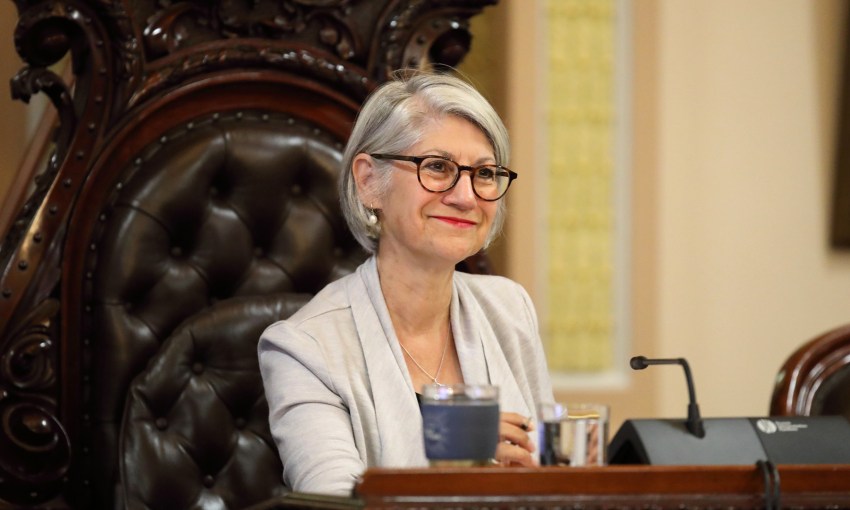Lord Mayor Sandy Verschoor has detailed her plan to provide guaranteed Indigenous representation on the Adelaide City Council.
Lord Mayor explains how she’s fighting for a Kaurna voice to council
First Nations representation in the Adelaide City Council should be legislated, Lord Mayor Sandy Verschoor told CityMag.
“I believe that we should look to the City of Adelaide Act to designate that one elected member must be representative of Kaurna,” she said.
Verschoor told the Adelaide City Council Reconciliation Committee last week that she was investigating legislative changes to the City of Adelaide Act to include a Kaurna representative on the Adelaide City Council.
“There’s lots of discussions here as to how and make sure there is always at a seat at the table, particularly in the City of Adelaide council chamber,” Verschoor said on Thursday.
“We have to do it through legislation.
“We are trying to work through reform through legislation to enable that to happen.”
First Nations representation in government has been called for previously, most notably with the 2017 Uluru Statement from the Heart asking Federal Parliament to enshrine an Indigenous voice within the Constitution.
South Australian Premier Steven Marshall has also historically flagged plans to create an Aboriginal voice to Parliament on a state level.
Verschoor said she hoped to create a city council Kaurna elected member position similar to how the council mandated an Indigenous person sit on the council’s Kadaltilla/Park Lands Authority: a body tasked to help steer decision-making for the city’s green belt.
“In the same way that we changed the charter of Kadaltilla/Park Lands Authority to ensure that one member of the board should be representative of ‘Indigenous culture and reconciliation’, I believe that we should look to the City of Adelaide Act to designate that one elected member must be representative of Kaurna,” she said.
“We are on Kaurna land and the Kaurna community should be encouraged to take up the opportunity to be involved in decision-making on [the] council. They are a valuable source of knowledge and bring an important perspective to the table.”
New here? Sign up to receive the latest happenings from around our city, sent every Thursday afternoon.
She said last week’s Reconciliation Committee meeting, which touched on the matter, inspired “great discussion” and questions from representatives of numerous local Aboriginal communities.
“There are at least five Aboriginal organisations within the City of Adelaide, all who have a vote and the ability to nominate a representative to run in the next election,” Verschoor said.
“I will continue to work with the committee to assist, wherever possible, to encourage a Kaurna community member to nominate.”
When asked what prompted the push to have a Kaurna voice to council, she said the City of Adelaide had always “led the way” in terms of reconciliation.
The Adelaide City Council was one of the first councils to sign a reconciliation statement in 1997, and was the first council in Australia to finalise 10 Reconciliation Action Plans, with the most recent 2021-2021 Stretch RAP plan, Verschoor said.
Meanwhile, at this week’s Adelaide City Council committee meeting on Tuesday night, City of Adelaide governance manager Mick Petrovski said the council would invite Indigenous groups that reside or “take up space” in the city to give council feedback on how they can register or nominate candidates in the upcoming election.
Petrovski said encouraging communities from all corners of the city to participate in the election process was high on the council’s agenda.
Veteran councillor Anne Moran said the current council had “enormous” racial diversity and wasn’t sure what “problem” the diversity push would solve.
“I’m a little uncomfortable with the administration picking groups out of religion, ethnicity or whatever, to go and make them… try to encourage them [to vote],” she said.
“Sounds like a sociological experiment that I’m not comfortable with.”
Petrovski said the initiative was informed by a former council decision about increasing diversity of candidates and voter turnout in the City of Adelaide elections.
Only 32.9 per cent of eligible voters participated in the 2018 election (39,8215 ballots recorded), according to data collected by the Electoral Commission of South Australia. This was only slightly more than the 2014 election, which recorded 35,6136 votes.
“There isn’t an attempt on our part to be selective,” Petrovski said.
“We will be going through the various community groups that exist on our books and approaching them in writing.
“We won’t be picking or choosing.”
Deputy Lord Mayor Arman Abrahimzadeh said diversity was more than race: “It’s about gender, sexuality, abilities and so forth.”
Petrovski previously said he was personally assigned to explore possible legislative changes to the City of Adelaide Act, and the council would propose a policy position to the next State Government based on their findings.
Local government elections will take place in November.




